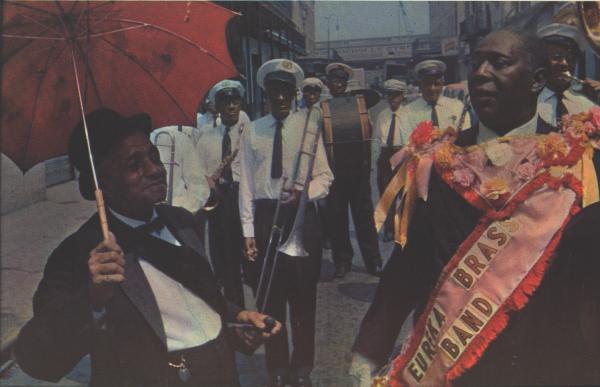
Editor, Webmaster: Phil Cartwright Editor@earlyjas.org
Additions, comments, corrections,
contributions to Bill Fuller %Earlyjas, or
e-mail: jazzytubs@aol.com
contributions to Bill Fuller %Earlyjas, or
e-mail: jazzytubs@aol.com
'Street' Music
In his book The Making of Jazz, James Lincoln Collier, says”
“…Because so much early jazz was played out of doors, at picnic grounds and in the
streets, the predominance of the marching band is understandable. Had jazz been
born in New England, where it is possible to perform outdoors for only five months
of the year, it might have taken a radically different shape. In the South the marching
band format prevailed. Marching bands could be quite large… but the bands of the
blacks and Creoles around New Orleans were much smaller…”
In Barry Ulanov’s book The History of Jazz in America, referring to the development of jazz
in New Orleans, he says:
“…the first large contribution to the new music was made by marching bands. They
marched (without the bass and piano) to wakes and from them in Negro New Orleans.
They marched for weddings and political rallies, when they were summoned away
from their ghetto precincts. They marched again and again, just to march, for the
pleasure of the members of the fraternal organizations and the secret orders with
which their culture abounded. There were always plenty of parades too… and when
the bands got going and the beat became irresistible the followers…fell in behind
the musicians…The bands blew a mighty sound along the streets and through the
alleys and into the squares of New Orleans…”
Not only then, but even today you might hear the brass bands of New Orleans play:
SECOND LINE-credited to New Orleans drummer, Paul Barbarin. Paul’s father, Isadore,
was the founder of the Original New Orleans Onward Brass Band.
JOE AVERY BLUES- a traditional New Orleans brass band classic purportedly named after
a New Orleans trombone player about whom we know little.
OVER THE WAVES-by Juventino Rosas, a tune which, in other incarnations, is known as
“Big Pond Rag,” or “The Loveliest Night of the Year,” or “George Washington Bridge.”
OH, DIDN’T HE RAMBLE-(1902) by Bob Cole and Rosamond Johnson. This tune was a
Cole-Johnson re-working, under the pseudonym of “Will Handy,” of a folk song entitled
“The Darby Ram.” It was introduced by the minstrel, George Primrose.
HIGH SOCIETY-written by Porter Steele in 1901, it was copyrighted by one Elmer Denton
and published as “a march and two-step.” In time the tune was caught up by New Orleans
brass bands and used in parades. By the 20’s, after Oliver recorded it in ’23 and Morton
recorded it in ’24, it became a New Orleans staple.
DOWN BY THE RIVERSIDE – a traditional Black American spiritual in the public domain
that surfaced somewhere around 1865, sometimes known as “Ain’t Gonna Study War No
More.” It was used in the film “Colorado Sundown” with Slim Pickens and was reprised
by Bing Crosby and son Gary in 1954.
| Earlville Association for Ragtime Lovers Yearning for Jazz Advancement and Socialization |
